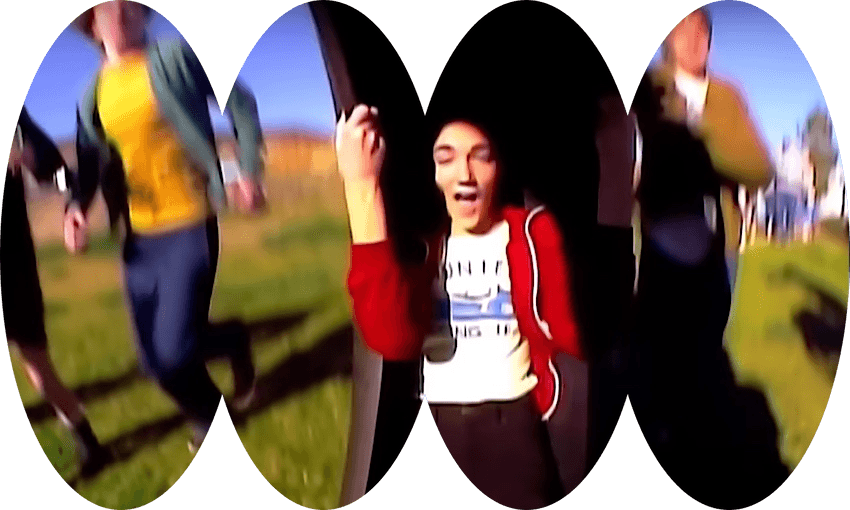Shimmering, elusive and gone before you know it’s there, Jonny Potts recalls that rush of teen freedom that can never be recaptured.
I was born in 1979. When most people of my generation see that number, they think of the Smashing Pumpkins song.
That song was playing on a cold and still Saturday afternoon in Whanganui while we discussed where we were going to get the booze that evening. Most Saturdays we visited a liquor store, underage and scared. Some of us had IDs faked with Letraset. One guy was at Lincoln University, another was doing Food Science at Massey. Mostly I would borrow someone’s glasses – I was convinced they made me look older – or talk loudly about going some fictitious 21st. The sun was throwing long shadows over the flat suburbs, and there was a slight tang on the breeze from the tannery at Castlecliff. Or the pet food factory or whatever it was. Not as bad as it could get, on warm days when the wind turned onshore, but definitely there, bruising the cold air.
It’s a shimmery, slippery thing, ‘1979’. It’s out of focus, it lacks a centre. While propulsive, its charm is mostly in its hazy ambivalence. It’s not a natural candidate for a successful single. But, to veer towards Pumpkinsian overstatement, it hit on something I may as well call “universal”. Like youth itself, it felt febrile and fleeting. Like adolescence, it was confusing but undeniable. Maybe the song was celebrating a bygone era: a youth enjoyed by the young of another decade, as its double art-rock parent LP suggests? Or was that sound the echo of foggy memories from Billy Corgan, who turned 12 in 1979? Or was he just cynically directing it at people like me, who were turning the magical number 16 and buying his records?
It didn’t matter. It was just a good song. Good like that Lynyrd Skynyrd song ‘Tuesday’s Gone’ from the movie Dazed and Confused. Or the Dire Straits one, ‘Romeo and Juliet’, which is in the Empire Records movie but not on the soundtrack CD. Poignant, forceful things. ‘1979’ was like that too. The difference was that ‘1979’ was not an artefact carefully unwrapped to complement someone else’s vision; it was fresh music revealing itself in real time in our real lives.
So it made sense that unlike the Skynyrd and Dire Straits songs, ‘1979’ didn’t frame things in the past tense (for the most part), nor was it overt in its yearning for something lost and gone forever:
“The street heats the urgency of now.”
‘1979’ is about the rush of immediacy and swell of possibility that comes with being young, delivered with the acknowledgment that it goes before you realise it’s there. As such, the song isn’t stuck in 1979, or 1995, at all. ‘1979’ is a song for anyone who implicitly understands what it means to meet up with “the lights and towns below” and with “headlights pointed at the dawn” even though you “feel the pull in a land of a thousand guilts”. I never thought I’d be making a case for Billy Corgan as the poet of my generation but, well, time makes fools of us all.
Time. What the song does, as so many other splinters of culture do, is stake out a corner of the mind, and convince the hearer, the reader, the viewer, that that little sliver of Time must still exist somewhere. It performs the same function as Rupert Brooke’s contention that after death and the passing of Time there will remain “some corner of a foreign field / That is forever England”. In reality, there might not even be a field anymore. What is it that older English gents are known to say, gazing over the asphalt and concrete that has colonised the wide, untamed landscapes of their childhoods? “When I was a lad, this were all just fields.”
As teenagers, we would drink in fields on Saturday nights. High schools, sports grounds, the golf course. On this cold, still night we realised we were close to crossing off all the sports venues in town. However, Springvale Park presented a problem: it was a broad, open field, surrounded by roads. With nowhere to hide, how could we tick it off the list? We ended up walking into the middle of the field, away from the streetlights. After a series of test observations, we identified a dead spot where passing headlights would not pick us up, and we stood, for two or three hours, shivering over cheap beer in the dark.
I remember Josh talking about his sister seeing The Cure. He’d seen the photos she’d taken of the show, somewhere in the States. Our beer was in the middle of the circle and he was standing to my left. Is there some corner of a local field that is forever underage drinking? I think that, in as much as any foreign battlefield can be said to be “England”, there is indeed some corner of a local field that is forever underage drinking. The sports field is still there. Somewhere on that land, it happened. But nothing commemorates it. It exists only as a memory, and probably only as my memory. But if you know ‘1979’, you kind of know what it feels like.
This sense of mastery and freedom, something older people remember as “feeling bulletproof”, is also at the heart of Michal Marczak’s docu-drama All These Sleepless Nights. Marczak filmed himself and his social circle as they were living through their early twenties, and the resulting film of party life in Warsaw is intriguing, energetic and bittersweet. Marczak makes specific reference at the start of All These Sleepless Nights to the “reminiscence bump”: the tendency for adults in and past middle age to recollect with greater intensity the memories forged when they were in adolescence and early adulthood. One theory for the prevalence of this phenomenon is that this is the time in our lives where we are forming our identities: the memories made in this period figure more prominently in the story we tell of how we have come to be the people we are. Having graduated from the dependencies of childhood, we are open to the lessons of life.
This theory is neatly reflected in Laurie Lee’s three autobiographical novels. The first, Cider with Rosie, is synonymous in its home country with reminiscence of “the England we have traded for the petrol engine”, as the blurb on my (1974) paperback puts it. The second is the perfectly named As I Walked Out One Midsummer Morning: a bold, vivid book brimming with the strength and promise of youth. It begins as Lee leaves his village and his mother. “At the bend of the road I looked back again and saw the gold light die behind her: then I turned the corner, passed the village school, and closed that part of my life forever … I was free. I was affronted by freedom. The day’s silence said, Go where you will. It’s all yours.”
Wow. That book ends with Lee deciding to go and fight for the Republican cause in the Spanish Civil War. In the third book, he does. It’s called A Moment of War and it deals with much more important subjects than bucolic idylls or playing the violin in London. It is the least read or celebrated of Lee’s trilogy.
None of us had heard of Lee at the time we used to go drinking in the fields of suburban Whanganui. The language that spoke to us was the lyrics of current pop songs, as it always is and should be with the young. We were preparing to leave the safe villages of our childhoods and confront the freedom of adulthood. We were declaring victory over those childhoods even as we enjoyed the freedom from responsibility which they allowed. I remember how it felt. I remember tripping over the low chain link fence on the way in to the park. I remember the panic which froze us all when an older couple passed close by us with a dog. Would they be dead by now? The dog, certainly. But they persist in my memory as a dark threat.
We are drawn to stories of adolescence and youth from the experiences of others because we recognise that time as a kind of home plate for ourselves. Too much knowledge of the world complicates and undermines the inherent excitement of becoming. I remember walking, inebriated, through Wellington at night in my late 20s and feeling the harshness of the cold. By then, the cold was just cold. It did not enhance or portend anything. The combination of alcohol and cold air had been done already; done to a young brain. Back then, the brain was gathering information. By now, that information had been calibrated and incorporated. Being drunk in the cold had become old hat. It was useless. It was annoying.
At the time, the experiences of late adolescence and early adulthood felt like they were prefiguring the life I was to lead. But the further I get away from it, the more it seems that the value and the meaning of those experiences was in the fleeting moments themselves. In his novel The Hours, Michael Cunningham writes about a middle-aged woman recalling a pleasant memory, the significance of which could only be revealed after the fact:
“There is still that singular perfection, and it’s perfect in part because it seemed, at the time, so clearly to promise more. Now she knows: that was the moment, right then. There has been no other”.
There has been no other.
For me, and the three or four guys standing drunk in a field in the isolated dark, there was a time when the world seemed bigger, and pockets of it were carved out and reserved for us. Those tightrope feelings of safety and exhilaration vanished. The dreams we cheered on for each other crashed. The long suburban afternoons, and the sharp cold nights they became, ended. We had it, and we lost it. And there was no rite of passage to mark its fading. The people we thought we were just ceased to exist. And we went fast. Faster than the speed of sound. Faster than we thought we’d go.



